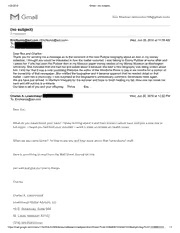
Charles Lowenhaupt Correspondence, 2010 PDF
Preview Charles Lowenhaupt Correspondence, 2010
The Financial Adviser News and insight for financial advisers, wealth managers and their clients June 18, 2010 VOICES: Charles Lowenhaupt, On a New Form of Isolation By Thomas Coyle Charles Lowenhaupt is chairman, chief executive and president of St. Louis-based Lowenhaupt Global Advisors, a multiclient family office. He tells WSJ Financial Adviser that recent U.S. legislation is making global wealth holders wonder if the U.S. still welcomes offshore family wealth — and the investment and innovation that comes with it. Congress and the administration have reacted to the financial chicanery by UBS, Lehman and Madoff with new laws that are likely to have significant unintended consequences globally. The tax-compliance laws intended to keep Americans from hiding funds in overseas accounts and also to make family offices register with the federal government. Europeans watch this legislative activity with grave concern. A European family-office expert recently told me that Europeans are starting to doubt “that family wealth is welcome in the U.S.” He had come from a meeting with some European family offices where topics included the new foreign-accounts compliance provisions under the Hiring Incentives to Restore Employment Act, and the consideration of requirements of registration by family offices. With their sovereign-debt problems, the uncertainty of the Euro, and a mounting sense of financial chaos, Europeans are looking for ways to invest and many would like to invest in the U.S. If one wants sovereign debt and considers the U.S. dollar stable, U.S. Treasury bonds make sense. U.S. equities still represent ownership in some of the best companies in the world. A second residence in the U.S. may make good sense too — as one Europe-based holocaust survivor put it, “The U.S. is still the best place to live in the world for a Jew.” And the U.S. is world-class when it comes to education, the most important investment of all. But European wealth holders feel unwelcome. They feel that their privacy will be compromised by all the new rules. They worry that as the U.S. debt continues to mount, the U.S. will confiscate foreign assets under the cloak of “anti-terrorist protection.” And they think of our global income tax and the expected re-instituted estate tax as frighteningly broad. They view our government as intrusive and grasping. Family offices are cautioning their family members to avoid the U.S. at all costs. They are taking families out of U.S. real estate investments. They are looking at ways to safeguard stocks and bonds with any U.S. connection. They are urging family members not to live in the U.S. For substantial numbers of European and South American families, the proposed confidentiality demanded has less to do with tax payments than with their desire to maintain a low profile. Kidnappings, business threats, and unwanted publicity come from wealth disclosures, and these people have no confidence that information held by the U.S. government will stay undisclosed. And their concerns about confiscation of foreign-owned assets heighten with every conversation about reducing the deficit. Consider the strengths of small countries like Switzerland, Singapore, Liechtenstein, New Zealand and others known for their receptivity to private wealth. Look at our own states, from Delaware to Alaska, one after another trying to build friendly trust laws to encourage wealth holders to do business in the state. Why, as a nation, would we want to be unfriendly to private wealth?
